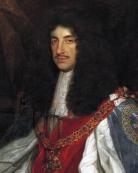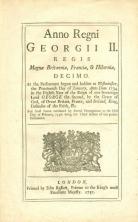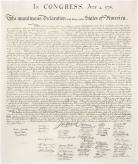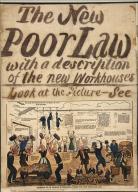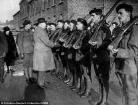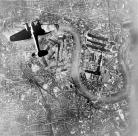British History 1660 - Present
Created by Amy Elliot on Sun, 02/07/2021 - 17:34
Part of Group:
A survey of major events in British history to accompany our discussion of the literature of the time period.
Timeline
Chronological table
| Date | Event | Created by | Associated Places | |
|---|---|---|---|---|
| 29 May 1660 |
Restoration of King Charles IIKing Charles II, the elder son of the lately beheaded King Charles I (1600-1649), was reinstated to the English throne. After King Charles I was killed, the Interregnum began, led by Oliver Cromwell. The English Civil War had been fought from 1642-1651 between the Cavaliers and the Roundheads over governance and religious freedom in England. Charles II had been exiled from England. Upon his return, the Stuart line was restored and lasted until King George I took the crown, begining the Hanover line. He promised greater religious toleration and amnesty for crimes committed during the Civil War. During his reign, he sought to re-establish the position of the Church of England. The theatres also re-opened, having been closed during Cromwell and the Puritan's time in power. He died without issue, leading his Catholic brother, James II, to take the throne. |
Amy Elliot | ||
| 1688 to 1689 |
The Glorious RevolutionThe Glorious Revolution happened when King James II was dethroned and his daughter Mary II and her husband William III, ascended. When King James II came into power, his overt Roman Catholicism alienated the majority of the population. The revolution was motivated both politically and religiously and was thus very complex. In the end it gave parliament more control over the monarchy which eventually led to the formation of a more political democracy. To get into more detail, King James II was Catholic and issued a Declaration of Indulgence suspending penal laws against Catholics (the laws that punish its offenders) and granted acceptance of some Protestant nonconformists. He then formally dissolved his Parliament and attempted to create a new Parliament that would support him unconditionally in his catholic ways of governing and beliefs. Feeling that Catholic dynasty was imminent, the Wigs, who were the main group that opposed catholic succession, were especially outraged.
The fear of King James succeeding in this only grew when in 1688, King James II had a son, James Francis Edward Stuart, that pushed his older Protestant daughter Mary out of the spot as his heir. It became especially worrisome to nonconformists, which were the majority of the country, when King James II announced that his new son and heir would be raised catholic.
With these new announcements and the growing terror of the public, seven of James’s peers wrote to the Dutch leader William of Orange, saying that they would pledge their allegiance to him if he agreed to invade England. William was already planning to take military action against England, so these letters only encouraged him more.
King James had prepared for military attacks though and left London in order to bring his forces to meet the invading army that were backed by William of Orange. However, several of James’s men, including his family members, deserted him, and instead sided with William’s cause.
James then attempted to flee after returning to London in fear of his safety but was captured. He again tried to leave and successfully made it to France where his Catholic cousin Louis XIV held the throne. King James died there in Exile in 1701.
It was then that the new Convention Parliament met and after significant pressure from William, agreed to a joint monarchy with William as king and James’s daughter, Mary, as Queen. The joint monarchy agreed to more restrictions from parliament, and signed what would become a Bill of Rights, as well as the right for regular Parliaments, free elections, and freedom of speech in Parliament. They also forbade the monarchy form being Catholic. Historians believe that this Bill of Rights was the first step towards a constitutional monarchy. This is the point in history that has ultimately led to Parliament’s increasing power in Britain while the monarchy’s influenced has waned. |
Blyss Bolger | ||
| 1 May 1707 |
Act of Union with Scotland
The Act of Union with Scotland was a treaty passed by both the English and Scottish parliaments in 1707. This act called for the creation of the United Kingdom (UK). Since 1603 England and Scotland were both ruled by the same monarch. In 1688 there were revolutions including the “Glorious Revolution” between the separate parliaments in England and Scotland. These revolutions turned into all-out warfare by 1703. In an attempt to fix this plus the issues of the French attack on England, and the economic issues in Scotland, the two countries signed the Act of Union, effectively uniting them and the UK was born. |
Dylan Bronkema | ||
| 1737 |
Licensing Act 1737The Licensing Act of 1737 was enacted by the Parliament of the Kingdom of Great Britain in order to control and censor what was being said about the British government in the theatre. Prior to the Licensing Act, rules regulating what could be said in plays were not really enforced. The theatre became a threat to the government by spreading ideas of revolution. The Lord Chamberlain, assisted by the Examiner, decided which plays could be publicly performed until the Theatres Act of 1968 abolished censorship of the stage. |
Ciara Dove | ||
| 4 Jul 1776 |
American "Declaration of Independence" IssuedThis document was written by Thomas Jefferson and adopted by The Second Continental Congress. There were twenty-seven colonial abuses that were outlined against King George III. This unanimous declaration of the thirteen colonies enabled them to ally with France and secure their aid against Great Britain. This pivotal formal statement is perceived as the birth of The United States of America. The document itself was a model and inspiration for other areas of the world such as Europe, Latin America, Africa and New Zealand during the 19th century. |
FRANCES M GIACALONE | ||
| 20 Jun 1789 to 27 Jun 1789 |
Tennis Court Oath in FranceThe Tennis Court Oath was made in Versailles, France, in Salle du Jeu de Paume, which was the royal tennis court. This oath was made because the First and Second estates locked the Third estate out of the normal meeting place. The third estate was attempting a reform and were outvoted. The First estate was comprised of the clergy, the Second of the nobility, and the Third estate made up the rest of the populous. As times were hard and the majority of the people within the country were ultimately outvoted and ignored by the other estates, they were forced to form their own assembly. The people made an oath not to leave until a constitution was written. This was a very important moment at the beginning of the French Revolution and the eventual declaration from the committee, Declaration of the Rights of the Man and of the Citizen of 1789, is a document still studied today. |
Jennifer Lundy | ||
| 18 Jun 1815 |
Battle at WaterlooThis battle took place on June 18, 1815. During this period, Napoleon Bonaparte was emperor of France and he saught to grown in power over the entire continent of Europe (and likely potentially the world). This battle took place in Belgium as Napoleon was looking to expand his empire greater. Together with the forces of Prussia, the British forces were able to defeat Napoleon, which was the end of the domination he had in Europe.
|
Lydia Ferguson | ||
| 16 Aug 1819 |
Peterloo MassacreThe Peterloo Massacre occurred during the summer of 1819 in St. Peter's fields in Manchester. The goal of this massacre was to disperse a politically radical group by calvary that was meeting peacefully due to the lack of jobs and high food prices. This attack was due to higher class citizen's fears of a violent Jacobin revolution happening in England just after the Napoleonic wars. These "radicals" in reality wanted parliamentary reform, but instead, women and children were attacked, leaving about 500 injured and 11 dead. |
Abrianna Margolis | ||
| The start of the month Summer 1832 |
First Reform Bill of 1832The First Reform Bill was meant to quiet the glowering inequalities between the traditional rural locals and the rapidly rising industrial areas of England, thus it was written by Prime Minister Charles Grey and introduced into the House of Commons in March 1831 by John Russel. However, it only passed with one vote in the House of Commons and did not pass in the House of the Lords. The subsequent sequel drafts of the First Reform Bill had similar issues with not passing the House of the Lord, and this prompted Grey to propose that King William IV allow Grey to create 50 liberal peers. King William refused and Grey almost resigned as prime minister until the Duke of Wellington failed to form a new government at the behest of the William. The bill ended up passing the House of the Lords, and became law in June 4, 1832. The First Reform Act itself changed the electoral system of Britain by redistributing seats and changing the conditions (some people even lost their electoral vote entirely). Ultimately, the Bill left large groups of the working and lower middle class without any vote. The new middle class had a bigger share in the politics of government and ended up quieting the discourse about who had a say in the inner workings of the English Government. Truthfully, the First Reform Bill was meant to make peace between the upper- and middle-class while continuing certain traditions. |
Skylar Rainey | ||
| 1834 |
Poor Laws EnactedAfter an investigation into the current Poor Law, a new Poor Law was put into place in 1834. The new law looked to reduce the cost of looking after the poor and establish a nationalized system of looking after the poor. Able-bodied people and their families were not to receive any aid. Also, every parish (church congregation) had to build a workhouse for the poor people to go and live in. Only people living in workhouses were allowed to receive aid. The workhouses had specifically harsh conditions to avert people looking to live in them. |
Yehudis Shapiro | ||
| 1845 to 1852 |
The Irish Potato FamineThe Irish Potato Famine started in 1845 and lasted until 1852. It was caused by the rapid spread of a fungus called Phytophthora infestans. The infestation ruined half the crops grown in 1845, and three quarters of the crops grown for the next seven years. The tenent farmers at the time relied heavily on potatoes as a food source due to Parliament passing laws that made grains incredibl expensive. Parliament would repeal these tariffs, but it did little to aid the poor tenant farmers who relied heavily on the potatoes they grew. Before the famine finally came to a close roughly one million people had died of starvation and other related conditions, with around another million fleeing Ireland as refugees. |
Jacob Rosenberg | ||
| 1 May 1851 to 15 Oct 1851 |
Great Exhibition opens at the Crystal PalaceThe Great Exhibition is also referred to as the Crystal Palace since it was housed within the palace itself. It was built by Joseph Paxtion and was opened on May 1st, 1851 by Queen Victoria. This exhibition hall built from iron and glass was one of the first World Fair exhibitions that held objects that pertained to industry and culture. It was said that this location on its own housed hundreds of thousands of objects which were display amongst ten miles by numerous contributors. This structure was located in Hyde Park, London, United Kingdom. However, it was closed on October 15th, 1851 and was taken down in 1852. Soon enough, it was rebuilt and construction finished in 1854. It was then in the borough of Bromley which is also known as Sydenham Hill. This site remained up until 1936 after that year it no longer survived since it was stated that this Victorian masterpiece was actually burned to the ground on November 29th. However, what was left of the original Crystal Palace still remains in London in what is now known as Kensington Gardens and still has some remnants of what once was The Great Exhibition. |
Jessica Russo | ||
| 5 Oct 1853 to 30 Mar 1856 |
War in Crimea BeginsThe Crimean war started when Russia invaded Turkish territories (current-day Romania). Britain, France, and the Ottoman Turks were allies against the invading Russians. The war began well, with the allies winning a few battles and gaining confidence. But once winter came, things degraded fast. The combination of the weather and the Russian intervention, the troops were cut off from supplies of food, fresh water, and medical supplies. Many soldiers were carted to nearby hospitals that were under-equipped and overwhelmed, only to die not long after arrival. Although this issue was not an uncommon one, the fact that there was a war correspondent back in Britain, the mistreatment of the troops reached the public. This led to a reform of the army staff and subsequently the roads, and overall sanitary conditions. This reform even led to what would be the standards for modern professional nursing. By spring of 1855, the British troops were much better taken care of. By the next winter, it was the French, not the British, that took the blow. Peace came after the loss of Stevanstopol and Kinberg, as the former had shaken the Russians. After the Austrians threatened to join the allies, the Russians signed the Treaty of Paris in March of 1856. |
Jennifer Lundy | ||
| 10 May 1857 to 20 Jun 1858 |
Indian Rebellion of 1857The Indian Rebellion of 1857 was a major, but unsuccessful, revolt against the British East India Company, who ruled over India on behalf of the British crown. It started with a mutiny of a group of Indian infantry men that then erupted into several other mutinies and civilian rebellions. The revolt grew out of resentment for British social reforms, harsh taxes, and skepticism about British “improvements”. Many Indians rebelled but many also fought for the British, while the majority were compliant with the rule. Cruel violence was inflicted by both sides, towards officers and civilians. The rebels were officially defeated on June 20, 1858 and rebels not involved in the violence were granted amnesty. |
Ciara Dove | ||
| 1867 |
Second Reform BillThe Second Reform Act of 1867 followed the 1832 Reform Act. This Act focused on giving voting rights to more people. This was granted with the Act, but women were still discluded from this. The Act opened up the right to vote for all householders in the boroughs and people paying rent of more than $10 per year. It also reduced the land threshold necessary to vote, allowing more farmers and landowners the right to vote, even if they had a small amount of property. This led to a 6 million people rise in eligible voters, and was described as a "leap in the dark" by Lord Derby, a politician. |
Yehudis Shapiro | ||
| 22 Jan 1901 |
Queen Victoria diesOn January 22, 1901, Queen Victoria of England died. She died at the age of 81 due to a cerebral haemorrhage. She had reigned for 63 years, and had been known for making an empire across the globe. She was also Empress of India. After her death, her son Edward VII came into power and strengthened ties with other European countries, and strengthened the military which helped when it came to WWI.
|
Lydia Ferguson | ||
| 1921 |
Republic of Ireland Gains IndependenceThe Irish Parlimentary Party (IPP) had aimed to get independence from England for years, but a majority of people were more attracted to Sinn Féin (means "We Ourselves"). When Sinn Féin won in 1918, they decided to not represent Ireland in the British Parliament but to start an Irish Parliament in Dublin. On January 21, 1919, the Sinn Féin gathered to start Dáil Éireann (a new Irish parliament) and proclaimed Irish independence. After attacks on the Irish Constabulary--which was supported by the British government--by the Irish Republican Army (IRA) and how the Dáil supported the IRA, this was seen as Ireland declaring war. Thus, this began the Anglo-Irish War where the IRA used guerilla warfare to attack the British security forces. (It is important to note that both sides committed attrocities.) The war came to an end in 1921 with Irish and British forces signing a treaty for an Irish "free state." The UK monarch at the time did still have some power in the Free State and Ireland split into two parts, with Northern Ireland being against the Free State. |
Skylar Rainey | ||
| Dec 1936 |
King Edward VIII abdicates the throneIn 1936 there was a constitutional crisis that plagued Britain, due to King Edward VIII’s engagement of Wallis Simpson, a well-known American woman who was just coming out of her second divorce. The United Kingdom government opposed their marriage because of the religious, legal, political, and moral objections that were raised. Edward was technically the head of the Church of England, which did not allow people to marry unless their ex-spouse had died. Even through all of the unwillingness to accept Edward and Simpson as a couple, he declared his love for her and got married, leading to his abdication in December of 1936. |
Dylan Bronkema | ||
| 7 Sep 1940 to 11 May 1941 |
The Blitz in WWIIThe Blitz, 'lightning,' or Blitzkrieg, 'lightning war,' was a German bombing campaign conducted by the Luftwaffe. Hitler had the Luftwaffe, 'air weapon,' target key areas in London. This was done in the hopes of securing Britain's surrender and ruining their economy. This is an example of total war where civilians were also a target. One defence strategy in preventing being seen by the Luftwaffe was the utilisation of 'blackout' curtains. There were approximately 32,000 deaths, 87,000 seriously injured and two million houses destroyed. |
FRANCES M GIACALONE | ||
| 1947 |
India gains independence from Great BritainIn 1947, India gained independence from Great Britain, with the help and strong leadership of Mohandas Gandhi. Gandhi fueled the revolution through the organization of peaceful protests against Britain’s oppressive rule in India. Britain had promised India self-government after World War II, but they were not delivering on their promise, so Gandhi and other India nationalists organized the nonviolent “Quit India” campaign to speed up Britain's departure. Britain didn't like that however, and instead put Gandhi and hundreds of others in jail. However, they finally relented after anti-British demonstrations accelerated. This also caused the Indian National Congress to reluctantly accept the creation of Pakistan in order to appease the Muslim League and conclude the independence negotiations. However, after the Indian Independence Bill took effect, it spearheaded a period of religious turmoil in both India and Pakistan resulting in the deaths of hundreds of thousands, including Gandhi, who was assassinated by a Hindu fanatic in January 1948 during a prayer vigil to an area of Muslim-Hindu violence.
|
Blyss Bolger | ||
| 6 Feb 1952 |
Queen Elizabeth II Ascends The Throne"God save the Queen!" At only the age of 25, following the death of her father, King George VI, Queen Elizabeth as the monarch, rightfully ascends to her throne. She was in Kenya at the time and was required to ascend the throne from abroad, but was coronated a year later at Westminister Abbey which was televised holding nearly 27 million viewers' attention. Since then, she has become the longest standing monarch in British history, holding her position now for 69 years this month. |
Abrianna Margolis | ||
| 4 May 1979 to 1990 |
Margaret Thatcher becomes first female Prime MinisterOn May 4th, 1979 Margaret Thatcher became the first female Prime Minister. She was born on October 13th, 1925 in Grantham, United Kingdom. Sources say that her father was involved in politics and conversations revolving around politics were prevalent during her childhood. This could be some factors that played into her getting involved in politics later in life. It was said that during the beginning of 1979 there was a general election that was called after the Callaghan ministry lost a motion of no confidence. Following the election, the results stated that The Conservatives won a 44-seat majority in the House of Commons, which confirmed that Thatcher would in fact become the first female prime minister in Great Britian. After being obtaining this position, she gained the nickname ‘Iron Lady’ due to her leadership style and uncompromising politics. Ultimately, Thatcher desired to change the rules of politics and leadership. It is stated that Thatcher was actually the longest serving PM for over one hundred and fifty years and that she served from 1979 to 1990. This position was not handed to her and it was evident that, that was not the case. Since she led the Conservative party since 1975, she won each re-election in both 1983 and 1987. In 1990 it was said that she resigned from being the prime minister of the United Kingdom along with being The Conservative party’s leader, however, her position in politics did not end there. Yes, she may have been challenged while she was in her well-known leadership position but that did not stop her from remaining in the Commons. In 1992, Thatcher finally retired from the Commons and was granted the title of a Baroness. She was then known as Baroness Thatcher of Kesteven in the County of Lincolnshire and was entitled to sit in the House of Lords. Her biggest accomplishment was that she is forever known for accelerating the evolution of Great Britian’s economy. Thatcher was named the most renowned British political leader since Winston Churchill. Baroness Margaret Thatcher unfortunately passed away on April 8th, 2013 at The Ritz in London, United Kingdom. She may have passed on; however, her accomplishments will certainly live on in history. |
Jessica Russo | ||
| 31 Jan 2020 |
BrexitThe withdrawal of the United Kingdom from the European Union and the European Atomic Energy Community. A UK wide referendum released in June 2016 had 52% of people vote in favor of leaving the EU, and the UK officially withdrew in Janurary 2020. Originally, the withdrawal was scheduled for March 2019 but was delayed due to a deadlock in Parliament. One of the reasons for people in the UK wanting to leave the EU was due to economic concerns. At the time of the referendum Europe's economic growth had started to stagnate, and many felt that the EU had done little to alleviate concerns. People also felt that remaining in the EU would cause a loss of sovereingty for the UK. |
Jacob Rosenberg |

